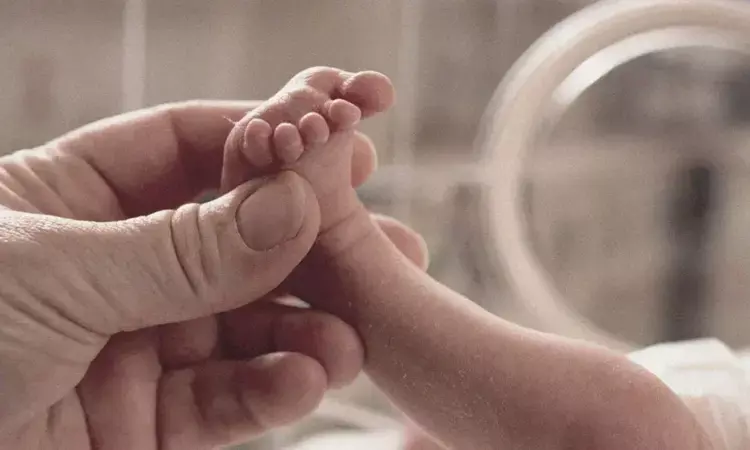- Home
- Medical news & Guidelines
- Anesthesiology
- Cardiology and CTVS
- Critical Care
- Dentistry
- Dermatology
- Diabetes and Endocrinology
- ENT
- Gastroenterology
- Medicine
- Nephrology
- Neurology
- Obstretics-Gynaecology
- Oncology
- Ophthalmology
- Orthopaedics
- Pediatrics-Neonatology
- Psychiatry
- Pulmonology
- Radiology
- Surgery
- Urology
- Laboratory Medicine
- Diet
- Nursing
- Paramedical
- Physiotherapy
- Health news
- Fact Check
- Bone Health Fact Check
- Brain Health Fact Check
- Cancer Related Fact Check
- Child Care Fact Check
- Dental and oral health fact check
- Diabetes and metabolic health fact check
- Diet and Nutrition Fact Check
- Eye and ENT Care Fact Check
- Fitness fact check
- Gut health fact check
- Heart health fact check
- Kidney health fact check
- Medical education fact check
- Men's health fact check
- Respiratory fact check
- Skin and hair care fact check
- Vaccine and Immunization fact check
- Women's health fact check
- AYUSH
- State News
- Andaman and Nicobar Islands
- Andhra Pradesh
- Arunachal Pradesh
- Assam
- Bihar
- Chandigarh
- Chattisgarh
- Dadra and Nagar Haveli
- Daman and Diu
- Delhi
- Goa
- Gujarat
- Haryana
- Himachal Pradesh
- Jammu & Kashmir
- Jharkhand
- Karnataka
- Kerala
- Ladakh
- Lakshadweep
- Madhya Pradesh
- Maharashtra
- Manipur
- Meghalaya
- Mizoram
- Nagaland
- Odisha
- Puducherry
- Punjab
- Rajasthan
- Sikkim
- Tamil Nadu
- Telangana
- Tripura
- Uttar Pradesh
- Uttrakhand
- West Bengal
- Medical Education
- Industry
Recurrent sepsis in extremely low birth weight infants tied to motor deficits: Study

Germany: In preterm infants, recurrent sepsis is associated with adverse long-term motor development, a recent study in Karger's Neonatology has shown. Also, infants with recurrent infections are at risk for preterm-related complications.
Sepsis is a severe medical condition that results from the body's response to an infection. A newborn having an infection and developing sepsis can have inflammation all over the body, leading to organ failure. The most common cause of sepsis is a bacterial infection; however, it can also be caused by parasites, fungi, or viruses.
Sepsis is considered a risk factor for brain injury in preterm infants. Alexander Humberg, University Hospital of Schleswig-Holstein, Campus Lübeck, Lübeck, Germany, and colleagues hypothesized that extremely low birth weight infants (ELBWI; one with a birth weight of less than 1000 g) having survived recurrent episodes of blood culture-proven late-onset sepsis (LOS) are more likely to have an adverse long-term neurologic outcome.
For this purpose, the authors' team from Germany evaluated the impact of recurrent late-onset sepsis on development at 5–6 years in a large multicenter observational study of ELBWI ≤28 6/7 weeks. Blinded investigators tested behaviour, neurodevelopment, and motor qualities.
The study revealed the following findings:
- The cohort consisted of 1343 ELBWI, including 1,080 infants without LOS, 186 infants with one LOS, and 77 with recurrent LOS, i.e., 55 infants with two and 22 infants with three LOS episodes.
- After Bonferroni-Holm correction, multiple logistic regression analysis revealed recurrent sepsis to be significantly associated with adverse motor development (critical MABC-2 testing: 3.3), whereas no significant impact of recurrent LOS was found on intelligence quotient and behavioural difficulties.
- The odds of having critical motor testing results for infants with recurrent LOS were 1.7 times that of infants with one LOS.
"Recurrent sepsis in preterm infants is linked with adverse long-term motor development," the researchers wrote. "However, infants with recurrent infections are also at risk for preterm-related complications, and reasons for a worse neurodevelopmental outcome needs investigation."
Reference:
Humberg A, Fortmann MI, Spiegler J, Rausch TK, Siller B, Silwedel C, Marissen J, Herting E, Göpel W, Härtel C; German Neonatal Network (GNN). Recurrent Late-Onset Sepsis in Extremely Low Birth Weight Infants Is Associated with Motor Deficits in Early School Age. Neonatology. 2022 Nov 3:1-8. doi: 10.1159/000525709. Epub ahead of print. PMID: 36327925.
Dr Kamal Kant Kohli-MBBS, DTCD- a chest specialist with more than 30 years of practice and a flair for writing clinical articles, Dr Kamal Kant Kohli joined Medical Dialogues as a Chief Editor of Medical News. Besides writing articles, as an editor, he proofreads and verifies all the medical content published on Medical Dialogues including those coming from journals, studies,medical conferences,guidelines etc. Email: drkohli@medicaldialogues.in. Contact no. 011-43720751


